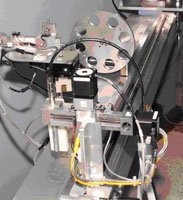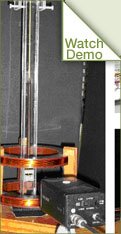 Acaba de presentar-se una proposta de laboratori a distància anomenada ILabCentral, que vol juntar esforços de diverses universitats per compartir instrumentació avançada amb els centres d’ensenyament secundari, per tal que aquests puguin fer pràctiques que altrament no estarien al seu abast. Aquest projecte està liderat per la Northwestern University i pel MIT, i de moment tenen finançament de la Nationa Science Foundation. El guiatge de la pràctica es fa tota via web, amb robots, webcams i comandes per ordinador. (notícies a Wired Campus,
Acaba de presentar-se una proposta de laboratori a distància anomenada ILabCentral, que vol juntar esforços de diverses universitats per compartir instrumentació avançada amb els centres d’ensenyament secundari, per tal que aquests puguin fer pràctiques que altrament no estarien al seu abast. Aquest projecte està liderat per la Northwestern University i pel MIT, i de moment tenen finançament de la Nationa Science Foundation. El guiatge de la pràctica es fa tota via web, amb robots, webcams i comandes per ordinador. (notícies a Wired Campus,
A part de l’interès intrínsec d’aquesta proposta, que ja l’havia vista alguna vegada formulada de forma semblant, crec que val la pena seguir els comentaris que provoca. Des del tipus “el futur de les pràctiques de secundària és aquest” fins a “només algun tipus especial de pràctiques es pot fer”. En particular, les pràctiques de química no semblen tan adients.
Cal diferenciar aquesta proposta d’altres basades en la simulació computacional. I no em refereixo només a la simulació basada en mètodes de la química quàntica o de la mecànica molecular, sinó en simulacions, per exemple, de valoracions en química analítica.
 ILabCentral té el lema Real Labs. Real Learning. Com a exemple hi ha pràctiques d’espectroscòpia amb una font de neutrons. No està pas malament. O una altra de cristal.lització de polímers. Ara mateix n’hi ha nou, entre les dues universitats esmentades.
ILabCentral té el lema Real Labs. Real Learning. Com a exemple hi ha pràctiques d’espectroscòpia amb una font de neutrons. No està pas malament. O una altra de cristal.lització de polímers. Ara mateix n’hi ha nou, entre les dues universitats esmentades.
En la presentació, val la pena senyalar aquesta frase
He noted that many organizations and professors are still not convinced that lab classes can be done virtually, but he is trying to change that. He plans to meet with the College Board soon to try to persuade them to accept virtual labs in their Advanced Placement courses.
“The high-school science lab of the future is this,” he said, holding up his laptop computer.
Però també crítiques sobre la manca d’emoció:
Of the five senses of touch, sound, taste, smell, and sight, a computer only addresses 2, and then with significant degradation. This approach may have its uses, but only as a supplement, not a substitute.
However, my real pet peeve with virtual labs, is the lack of excitement over science that students will experience. In discussing with science colleagues why they went into science, it is very common for them to say they had a junior high or high school teacher that provided great laboratory experiences. I count myself among that group. When thinking of your own science classes in your education, do you remember the lectures or the labs? If you had a poor teacher who didn’t do any labs, you probably don’t remember anything about science class except that you hated it.
Però és millor que no pas l’experiment virtual:
The key word here is “excellent.” Most virtual labs provide no real science experience. The data that students collect has been preprogrammed and is very precise and “clean.” Thus, the student experience is exactly the opposite of what a good lab provides.
The iLab concept is one way of overcoming this problem and of providing real data from the real world to students. The best lab experience will provide students with learning opportunities not available from lectures, textbooks, and videos. Students should understand the nature of science, develop scientific reasoning skills, and appreciate the complexity and ambiguity of the work that scientists do.
Em sembla un tema apassionant.